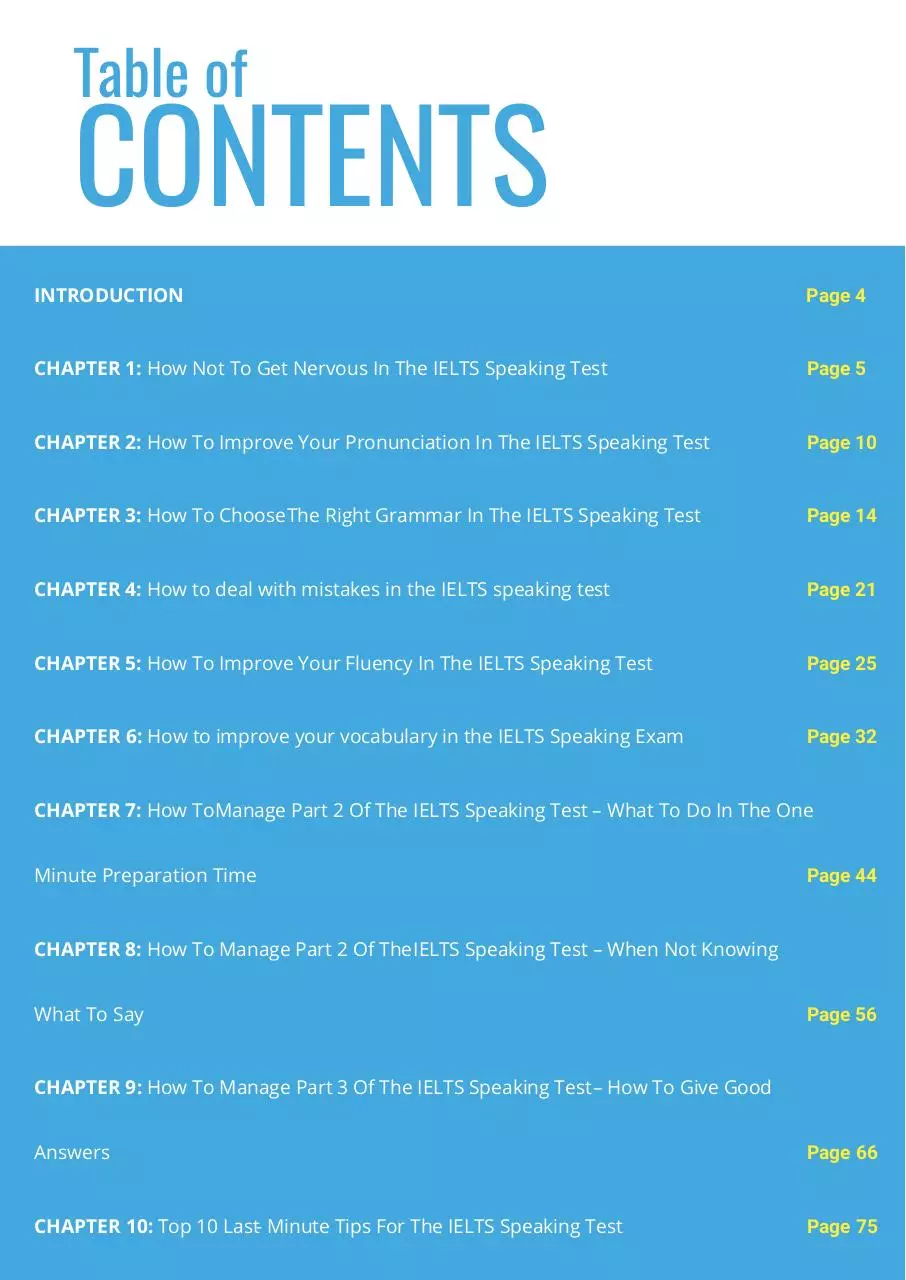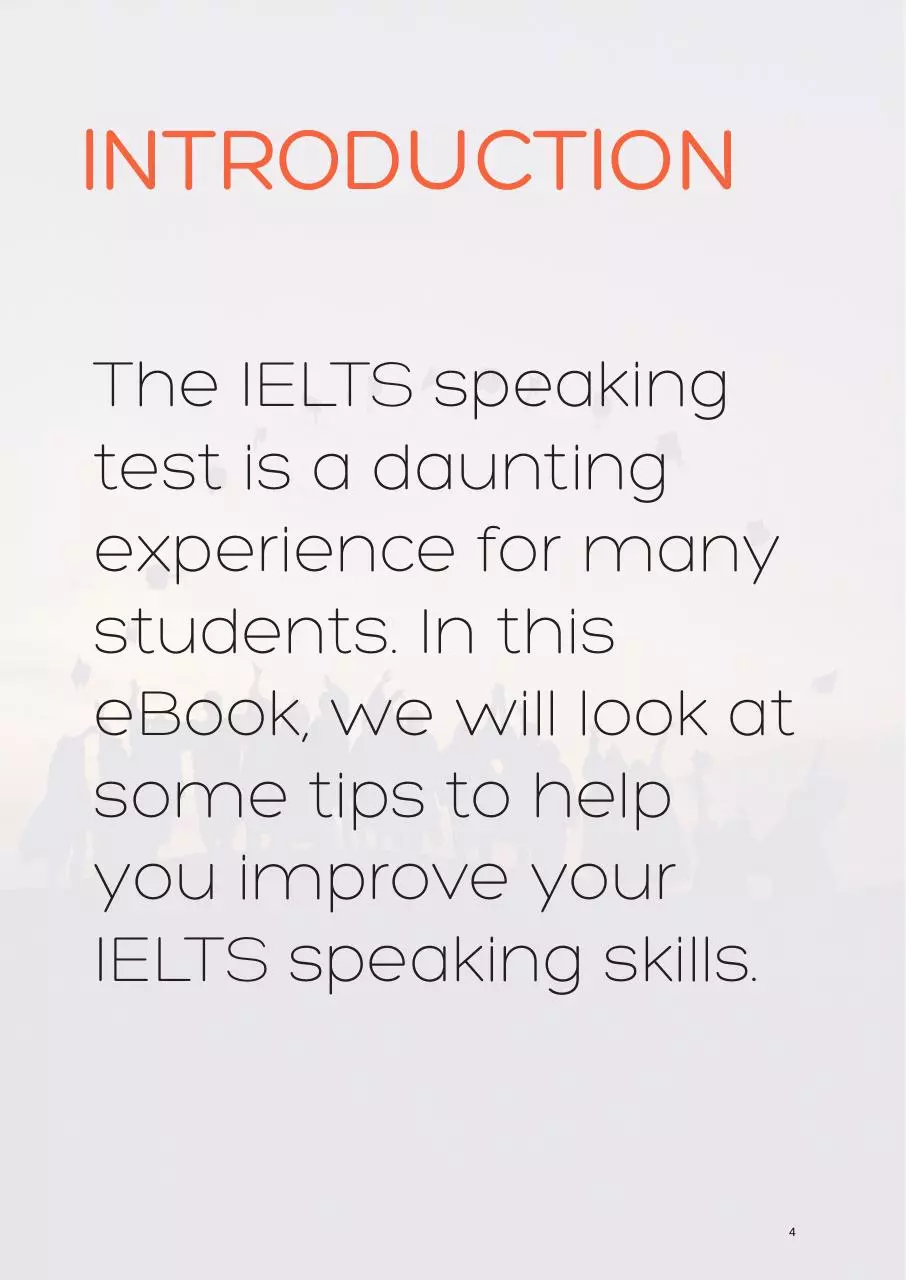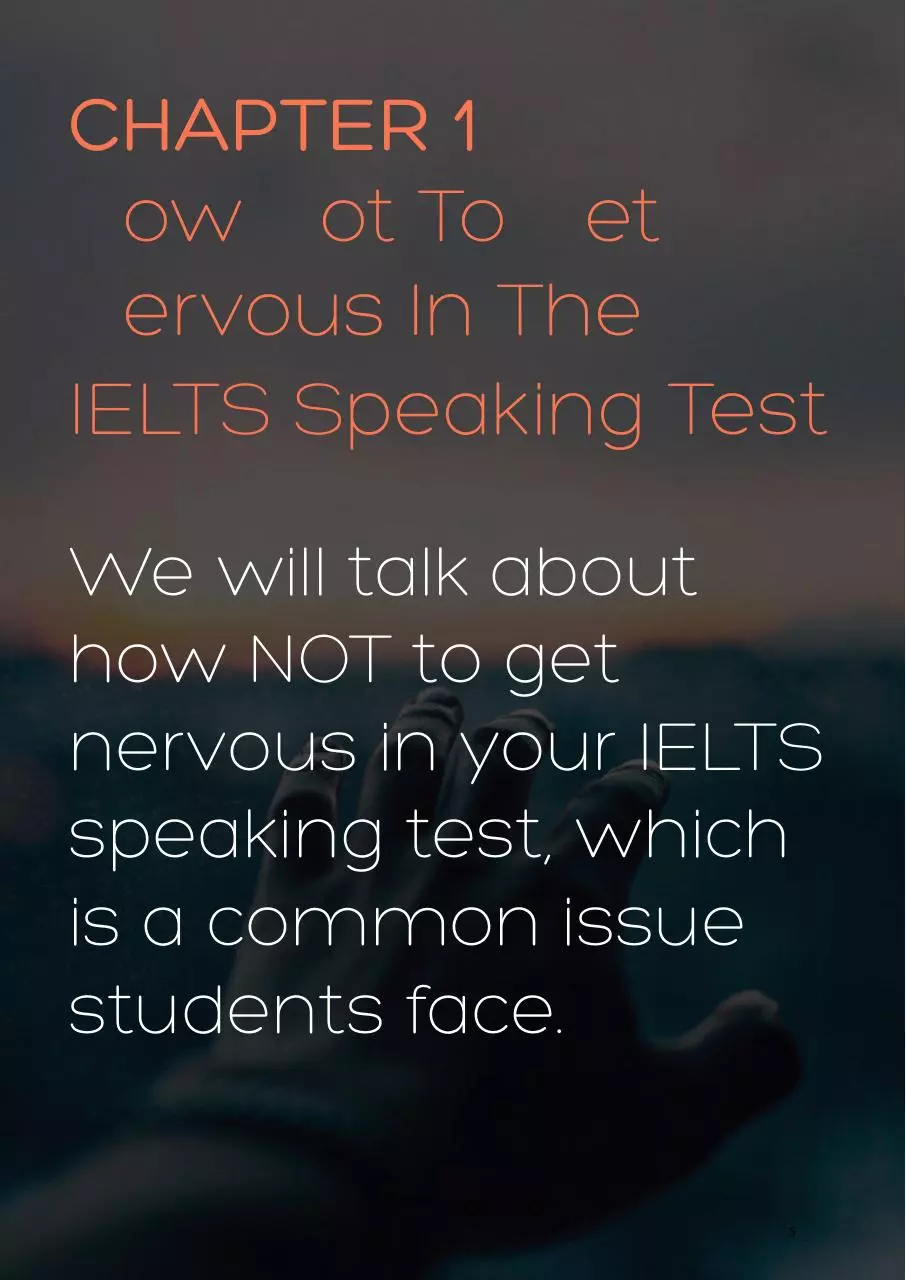IELTS Tips Sample secured (PDF)
File information
Title: IELTS Tips ebook copy
This PDF 1.6 document has been generated by Adobe Illustrator CS6 (Macintosh) / 3-Heights(TM) PDF Optimization Shell 4.7.19.0 (http://www.pdf-tools.com), and has been sent on pdf-archive.com on 21/06/2016 at 07:35, from IP address 210.6.x.x.
The current document download page has been viewed 1142 times.
File size: 3 MB (21 pages).
Privacy: public file





File preview
WHAT YOU NEED TO DO
TO GET A
LEVEL 8
IN IELTS SPEAKING
Sample
SUPER USEFUL TIPS ON HOW TO SUCCEED
IN YOUR IELTS SPEAKING EXAM
The design and contents of this guide is
Copyright © 2016 Swoosh English Ltd.
One of the Testimonials from
Satisfied IELTS Students
""I just read the Swoosh English e-book. After first reading it
for a while,I already felt that it is a very useful book for IELTS
candidates, especially for the ones who are struggling in
preparing for speaking exam. This book have detailed
descriptions about how to manage anxiety during the exam,
as well as how to prepare each part of the speaking exam
effectively.
These may be something trivial that students often neglect,
but after reading this book, I feel that stress management
and preparation tips are actually keys in achieving a high
band score in speaking exam.
I really appreciate Swoosh's effort into producing this eBook
and it is definitely a big help for IELTS students who are
currently preparing for the IELTs speaking exam. Once again
thanks very much for e-book.""
Manu - IELTS Student, India
www.SwooshEnglish.com
Table of
CONTENTS
INTRODUCTION
Page 4
CHAPTER 1: How Not To Get Nervous In The IELTS Speaking Test
Page 5
CHAPTER 2: How To Improve Your Pronunciation In The IELTS Speaking Test
Page 10
CHAPTER 3: How To Choose The Right Grammar In The IELTS Speaking Test
Page 14
CHAPTER 4: How to deal with mistakes in the IELTS speaking test
Page 21
CHAPTER 5: How To Improve Your Fluency In The IELTS Speaking Test
Page 25
CHAPTER 6: How to improve your vocabulary in the IELTS Speaking Exam
Page 32
CHAPTER 7: How To Manage Part 2 Of The IELTS Speaking Test – What To Do In The One
Minute Preparation Time
Page 44
CHAPTER 8: How To Manage Part 2 Of The IELTS Speaking Test – When Not Knowing
What To Say
Page 56
CHAPTER 9: How To Manage Part 3 Of The IELTS Speaking Test – How To Give Good
Answers
Page 66
CHAPTER 10: Top 10 Last- Minute Tips For The IELTS Speaking Test
Page 75
INTRODUCTION
The IELTS speaking
test is a daunting
experience for many
students. In this
eBook, we will look at
some tips to help
you improve your
IELTS speaking skills.
4
CHAPTER 1
How Not To Get
Nervous In The
IELTS Speaking Test
We will talk about
how NOT to get
nervous in your IELTS
speaking test, which
is a common issue
students face.
5
TIP NUMBER 1 –
Be Prepared (To
Calm Your Nerves!)
When we talk about preparation,
it is not just about trying to
prepare for possible answers. It is
important to know a few things.
First, understand the structure of
the speaking test. How much
time does the test take? How
many parts are there to the
speaking test? What is each part
of the test about? Or do I have to
give a speech, or have a
discussion with the examiner?
and so on.
6
Second, learn how the IELTS
speaking exam is scored.
If you want to impress the examiner,
you need to know what the
examiner wants! In short,
pronunciation, fluency and
coherence, grammar and vocabulary
all count for 25% of the score.
Finally, yes, you will never know what
questions you will be asked in the
speaking test, but there are some
common topics that you can
prepare for, such as family, work, and
travel.
Remember, do NOT memorise your
prepared answers for the test. Why
not? When the examiner finds out
you are not actually speaking
naturally, you may not get a high
score or you may even lose marks.
And, believe me, they will know!
7
What can I do to avoid
having to memorise
answers then?
You may ask yourself.
Well, you can still learn
more vocabulary and
phrases of commonly
asked topics by simply
practicing more
frequently. This will
allow you to get better
at using the vocabulary!
But speak naturally!
8
Want To Read More?
Get the full 76-page eBook now!
TIP NUMBER 2 –
Arrive Early!
A simple way to help you not to
get stressed is to arrive early.
Many speaking tests do not take
place right after the other test
components of the IELTS exam.
You may even be asked to come
on a separate day to take the
speaking test only.
It is very important that you
arrive at the test venue at least
30 to 40 minutes before your
speaking test appointment.
In this way, you will have plenty
of time to calm yourself down
and be mentally prepared.
9
CHAPTER 2
How To Improve Your
Pronunciation In The
IELTS Speaking Test
If you know how the IELTS
speaking test is scored, you will
understand that pronunciation is
one of the four marking criteria,
and it counts for 25% of your
speaking score. It is of course
important to work on your
pronunciation for the test.
There is no quick fix on improving
pronunciation and you might be
asking yourself what you can do
about your pronunciation during
the speaking test.
Here are a couple of tips that may
be useful for you.
10
TIP NUMBER 1 –
Speak Naturally
Learn how not to feel nervous
in front of the examiner.
By being more relaxed, you can
enjoy a normal conversation
with the examiner. Speak
naturally.
Don’t rush, it is always better to
speak clearly rather than rush
through your speech. By
speaking naturally, you will be
able to show your emotions
when you speak and improve
the rhythm of your speech.
11
TIP NUMBER 2 –
Think And Speak In
Chunks
A common problem students
have when taking the speaking
test is they translate every word
in their head before saying it out
loud. So it sounds like they pause
after every word which affects
their pronunciation score.
To help improve the intonation of
speech and sentence stresses,
try to use the ‘Chunking’
technique. Chunking is talking in
rhythm by grouping the words,
with short silences in between or
change in tone.
12
For example, when you say this
sentence. Don’t say it like this:
‘Last – year - was - the --best
-- year - of - my - life.’
Say it like this: ‘LAST year // was
the BEST year // of my LIFE’.
Can you tell the difference?
So think and say in chunks. You
will speak more naturally in
chunks of words with better
pronunciation and intonation.
This will help the examiner
understand your messages
much better and clearer.
13
Want To Read More?
Get the full 76-page eBook now!
CHAPTER 3
How To Choose The
Right Grammar In
The IELTS Speaking
Test
We will talk about how
to choose the right
grammar in the IELTS
speaking test. Here are
a few tips that
hopefully can help you
prepare better for the
test.
14
TIP NUMBER 1 –
Be Prepared (So You
Can Speak With
Perfect Grammar!)
Being prepared and having
practised for the test is always
one of the best ways to avoid
any surprises in the test. In the
IELTS speaking test, one of the
four marking criteria is
grammatical range and
accuracy.
First, a key area that the
examiners will look at is your
grammar, and how varied the
range of the grammatical
structures you cover in your test.
15
Let’s look at what is required to
achieve a band score 6.0 for the
IELTS speaking test, which is to
use a mix of simple and complex
structures with limited flexibility.
Even at band score 5.0, you are
expected to produce a limited
range of more complex structures
even though they may have
errors or comprehension issues.
Here are the actual descriptors for
6.0 and 5.0.
6.0: uses a mix of simple and
complex structures, but with
limited flexibility.
5.0: uses a limited range of
more complex structures, but
these usually contain errors and
may cause some
comprehension problems.
16
This means your answers should
at least include some complex
structures to achieve a minimum
of 5.0 in grammatical range and
accuracy.
Another way you can be more
prepared for the grammar is by
knowing the format and types of
questions that may appear in each
section.
For example, many tasks in IELTS
section 2 relate to the past, which
often asks you to describe a past
story or experience. So, when you
practise, make sure you
understand different past tenses,
such as past simple, and present
and past perfect tenses, and how
you can use them effectively.
17
Want To Read More?
Get the full 76-page eBook now!
If you enjoy reading this eBook,
click the link below to buy it
for only $6.99!
Get Your Copy Now
Download IELTS Tips Sample secured
IELTS Tips Sample_secured.pdf (PDF, 3 MB)
Download PDF
Share this file on social networks
Link to this page
Permanent link
Use the permanent link to the download page to share your document on Facebook, Twitter, LinkedIn, or directly with a contact by e-Mail, Messenger, Whatsapp, Line..
Short link
Use the short link to share your document on Twitter or by text message (SMS)
HTML Code
Copy the following HTML code to share your document on a Website or Blog
QR Code to this page

This file has been shared publicly by a user of PDF Archive.
Document ID: 0000391503.